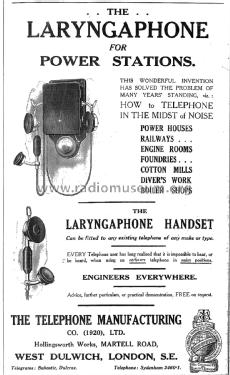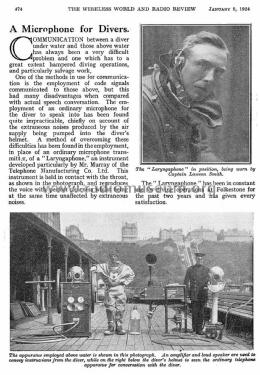- Country
- Great Britain (UK)
- Manufacturer / Brand
- TMC (Brand), Telephone Manufacturing Co. Ltd.; London
- Year
- 1920 ?
- Category
- Miscellaneous (Other, Various) - see notes
- Radiomuseum.org ID
- 351488
- Main principle
- Audio-Amplification
- Wave bands
- - without
- Power type and voltage
- Dry Batteries
- Loudspeaker
- - Is a Headphone or Earphone
- Material
- Various materials
- from Radiomuseum.org
- Model: Laryngaphone - TMC Brand, Telephone
- Shape
- Miscellaneous shapes - described under notes.
- Notes
-
The Laryngaphone: Whispering Through Vibration
Developed by Mr Williams of TMC in 1920, the Laryngaphone wasn't your typical microphone. It bypassed the mouth altogether, directly picking up voice vibrations from the throat through a small pad pressed against the skin. This ingenious design made it ideal for scenarios where ambient noise rendered normal speech unintelligible.
Conquering Noisy Environments:
The Laryngaphone telephone found diverse applications:
Industrial settings: Factories, mines, and other noisy workplaces became accessible for clear communication.
Military use: Communication during combat in loud environments like airfields and battlefields was aided by the Laryngaphone's ability to cut through background noise.
Aviation: Pilots and co-pilots could communicate effortlessly despite the roar of engines.
Medical contexts: Patients with laryngitis or vocal limitations could still be heard, even while whispering.
Diving into New Depths:
TMC went further, creating a waterproof version for underwater communication. This specialized Laryngaphone allowed divers to converse clearly, a significant innovation in underwater exploration and safety.
A Whisper in History:
While not as widely known as traditional microphones, the Laryngaphone stands as a testament to TMC's ingenuity and commitment to solving communication challenges in unconventional ways. Its legacy can be seen in the continued development of throat microphones for specialised applications today.
- Mentioned in
- Wireless World (The), London (WW, 79) (Jan 9, 1924, Page 474)
- Author
- Model page created by Gary Cowans. See "Data change" for further contributors.
- Other Models
-
Here you find 28 models, 17 with images and 1 with schematics for wireless sets etc. In French: TSF for Télégraphie sans fil.
All listed radios etc. from TMC (Brand), Telephone Manufacturing Co. Ltd.; London

